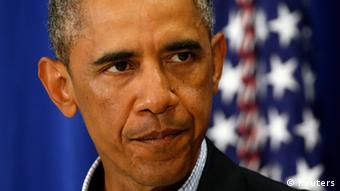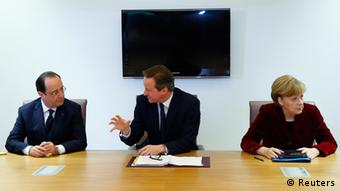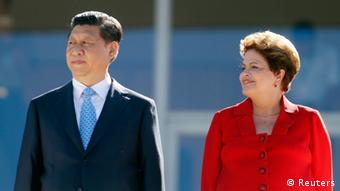UNITED STATES
In search of: The US role in the world
Neoconservatives decry it, realists relish it: A debate about whether US foreign policy has reached its retrenchment point exercises American experts and should worry Europe.
The sentiment that something is wrong with US foreign policy is not new to Americans. Arguably that feeling was one reason why US voters decided to elect a young Senator in 2008 who vowed to do things differently and end America's two protracted wars.
And while the debate about the future of America's role in the world had been simmering since then, it took the recent eruption of violence in the Middle East and Ukraine coupled with anarticle by the preeminent neoconservative thinker Robert Kagan as well as Hillary Clinton'scriticism of Barack Obama to really get the discussion going.
Essentially the argument circles around the question whether the US can and should be the world's decisive superpower in the future and whether Obama's retrenchment of US power is or should be the new normal.
Kagan, who didn't respond to a request for an interview, fears that retrenchment of US power could become the new standard for America's foreign policy. Notwithstanding the rise of China or changes in the global power structure, Kagan believes the US can retain its role as the sole superpower and shape the world accordingly. The problem, he argues, is that Americans are becoming increasingly skeptical about the outsized role of their country.
Looming detachment from world politics
"No one has taken a poll lately on whether the United States should come to the defense of its treaty allies in the event of a war between, say, China and Japan; or whether it should come to the defense of Estonia in a Ukraine-like conflict with Russia. The answers might prove interesting." writes Kagan.
Kagan argues that while US foreign policy has not always been successful, on the whole, the record has been positive.
"If there has been less aggression, less ethnic cleansing, less territorial conquest over the past 70 years, it is because the United States and its allies have both punished and deterred aggression, have intervened, sometimes, to prevent ethnic cleansing, and have gone to war to reverse territorial conquest."
Kagan's essay is a battle cry for an activist, internationalist US foreign policy whose days don't have to be numbered if only the American people decide not to let it happen:
"The world will change much more quickly than they imagine. And there is no democratic superpower waiting in the wings to save the world if this democratic superpower falters."
External factors force new US role
Barry Posen, a leading realist, is not impressed.
"Robert Kagan is entitled to believe what he wants to believe and to marshal the world to the theory about how the world works he believes to be accurate," Posen, a political science professor at the Massachusetts Institute of Technology and author of a new book told DW.
Like Kagan, Posen has a pronounced view of what's wrong with US foreign policy and where it should go in the future, which is pretty much diametrically opposed to Kagans.' Posen argues that America's strategy of global liberal hegemony has failed and that it's time for the US to overcome its activist foreign policy.
"Just on the basis of the longer way trend, China and the EU getting stronger, middle powers rising, diffusion of military technology, increase in the costs of applying military technology, I think those things are telling Americans that styling themselves as the sole superpower and taking upon their shoulders the task of most of the security and economic aspects of global politics is not going to be possible", Posen said.
He cites the US government's own Global Trends 2030 study published by the National Intelligence Council which shows three or four roughly equal major global powers. While the power of the US (and the EU) will have declined by 2030, China's and India's is projected to increase.
Message for Europe
Given that trend, and the record of America's effort to shape the world according to its wishes, staying the course is not only futile, but counterproductive, says Posen.
"I think we can look at the last 20 years and see that this is not a winning strategy," he says.
At the same time military expenditure in Europe and elsewhere has plummeted and is unlikely to rebound. And finally, "we have had these absurd clients in Afghanistan and Iraq whom we have tried to assist in one way or another that basically take our money and our military and don't take our advice. They are reckless drivers."
As a consequence, the US should slash its global military footprint dramatically, cut its defense budget to 2.5 percent of GDP (compared to 3.8 percent today) and let Europeans take their security in their own hands.
"We don't live in Europe next to this strange Russia. And we just have to look at the figures of - forget all the little powers - the larger states Germany, Britain and France. They have the wealth and the technology and the nuclear weapons to be fully competitive with whatever is left of Russia."
Retrenchment will not last
Stephen Sestanovich agrees that the momentum is strongly in favor of US retrenchment.
Obama, says Sestanovich, a former ambassador to the Soviet Union, who studied the foreign policy from Truman to Obama for his new book "Maximalist", is not only a classical retrencher. "He was hired by the American people specifically for that role in the same way Richard Nixon was hired to get out of Vietnam and Dwight Eisenhower was hired to get out of the Korean War."
For Sestanovich, much of the current debate is familiar. After US foreign policy becomes overstretched by an activist president, retrenchment presidents are elected to clean up the mess. Sestanovich thinks it possible that the current retrenchment may be longer than previous ones, but believes it will not last.
"My suspicion is that in one way or another there will be a renewal of American activism to meet challenges that will otherwise be seen as too dangerous."
Incapable US allies
While Sestanovich is convinced that a diffusion of global power is happening and that it will change the current international order, he believes the US and its partners are best suited to remain the world's leaders well into the future.
"The BRIC countries [Brazil, Russia, India, China - the ed.] have no concept of unity. By contrast the United States and its allies have a more unified conception of their interests. So one of the key factors over the next couple of decades will be whether that conception holds, whether the block that has been formed around the United States over half a century will continue to have the same sort of effectiveness that it had in the past."
As for Posen's argument that Europeans and others should shoulder more of the US' burden, Sestanovich does not buy it.
"In an ideal world that would of course be true and possible. But when Americans look at Europe, the Middle East or East Asia they don't see other countries able to provide for the stability that is in our interest and in theirs. So unfortunately for the foreseeable future the kind of diminished role that realists want is likely to involve considerable instability and the growth of new challenges to American interests." dw de




No comments:
Post a Comment